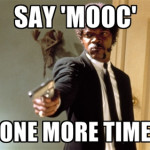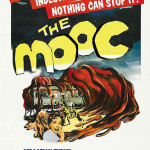An Ongoing Paradox In Online Education: Knowledge versus Knowing
By Paul Glader on April 7, 2014
Blended Learning, Domestic, Education Quality, MOOCs, Opinion, Personalized Learning, Required, Universities & Colleges
 Distortion — Bill Dickinson via Compfight
Distortion — Bill Dickinson via Compfight
By Carly Calhoun
In high school, I took Introduction to Economics at the University of North Carolina at Greensboro (UNCG) as an online video game. Students participated as virtual aliens that dropped down to a deserted earth and tried to make a thriving economy. There were a few quizzes and readings along the way, but I spent most of my time playing a video game.
I learned nothing about economics that semester. Instead, I learned how to play a game in a way that made me seem like I knew a lot about economics. Maybe I learned nothing because online education is sub-par, or maybe it was because I was a lazy high school student that didn’t care about economics yet. Whether you think online education is good or bad, at the center of the virtual education conversation is a fundamental disagreement about the nature of knowledge and how people come to know.
Universities and organizations are creating lots of massive open online courses (MOOCs) in an effort to make education available to thousands more at a fraction of the cost. Some educators are wary about potential dangers of online learning. The question at the heart of the discussion is this: is online learning (excluding its convenience and affordability) the best way to become knowledgeable?
If knowledge is a thing that people either have or don’t have, then online education makes sense. According to edSurge, an online publication that helps educators find the best education technology, in December 2013, more than 10 million people participated in 1200 MOOCs last year. That’s about 8,300 students per class. Students tune in to the course and soak up information through video lectures, readings and online quizzes.
The assumption is that knowledge is like a substance that can be passed on, and therefore participation in this method will create knowledgeable students. The nature of MOOCs treats knowledge like data. They presume that if we just give people more, then they will be more skilled and more knowledgeable.
Recent research in the field of Epistemology takes issue with this assumption. In her book Longing to Know, Geneva College philosophy professor Esther Meek explores the research of philosopher Michael Polanyi and proposes that knowledge looks less like “amassing information” and more like embodying a process.
In addition, philosophy professor Alvin Goldman argues in Knowledge in a Social World that education should pursue “shaping skills and techniques that facilitate autonomous learning and steer inquiry towards truth.” This method requires a process with an authoritative guide and an atmosphere that encourages learning. In other words, education should do more than just give people knowledge—it should create good knowers.
If knowledge is less like data and more like an embodied process, then MOOCs might be dangerous in relation to good knowing. It seems true that MOOCs are making some form of knowledge more accessible and affordable. However, most MOOC students do not have access to the authoritative guide or learning environment that modern epistemologists are calling essential to true knowing. In addition, only 4% of people enrolled in MOOCs find the diligence to complete the course.
The danger of removing the embodied process and authoritative guide from knowing creates a risk similar to my high school online experience. Students could end courses with no more understanding of a subject than they began with. Or worse, they could end with a distorted form of knowledge.
As a college freshman, it took me an entire semester of an embodied Introduction to Economics class to correct some of my erroneous knowledge from high school. I had to learn that supply and demand analysis wasn’t actually related to a certain number of mouse clicks from my right pointer finger at the right time, but that it involved a larger concept that I could only grasp with the help of an authoritative guide.
So what does this mean for online education? Do online courses help students arrive at the same form of knowledge that traditional learning does? According to epistemologists, they don’t. But that doesn’t mean we should throw the baby out with the bath water.
MOOCs were originally created through a for-profit educational technology company (Coursera—now one of many MOOC providers), but many universities are beginning to adopt the idea. The technology of online education has proved useful in the education world, but universities should use caution with these tools when trying to create knowledgeable students. As a solution, several universities have added online lab assignments, discussion forums, and video calling in addition to a classroom experience.
The goal of making education more accessible and affordable is a noble one. However, it would be a tragedy to produce erroneous knowledge in the process. The end goal in improving the higher education system should always be teaching people how to arrive at truth and embody the process of knowing with discernment. The MOOC world is currently absent of this necessity, but it doesn’t have to be. Every opinion around this issue contains a particular understanding of knowledge itself. A reevaluation of our understanding of knowledge could lead to affordable, accessible education that also creates good knowers.
Calhoun is a junior majoring in Media, Culture and the Arts (with a minor in Theology) at The King’s College in New York City.
Related Posts


Tips & Pitches
Latest WA Features
-
Online Courses Are Expanding, Along With Questions About Who Owns The Material
-
Why Size Matters: Consolidation Sweeps Across US Higher Ed
-
Trend: Corporate U Employers Offering Just In Time Education To Workers
-
Subterfuge & Skullduggery In The College Rankings Game
-
“Instreamia” Shakes Loose Moss By Launching Spanish Language Mini-MOOC
Domestic, Education Quality, For-Profit, Friend, Fraud, or Fishy, K-12, Legislation, Opinion, Personalized Learning, Regulatory, Required, Universities & Colleges - Apr 29, 2014 - 0 Comments
Michael Horn: NCAA March Madness Followed By April Blunder In Online Learning
More In For-Profit
- The Economy Is Forcing Tuition To Fall Rapidly At Private, For-Profit Colleges
- Kamenetz: Jeb Bush As Controversial Leader Of Aspen Task Force on Learning & The Internet
- Columnist Ryan Craig: The Best Of Times Could Return As For-Profit Edu Invests
- Bubble Analysis: Trace Urdan on Why This Era of Ed Investing Could Be Different
- A Blended Path? How American Honors Cuts Cost of Four Year Degree by Over a Third
Community Colleges Cost of Education Domestic For-Profit Required Student Loans Universities & Colleges
Cost of Education, Domestic, Education Quality, Friend, Fraud, or Fishy, Opinion, Personalized Learning, Required, Technology, Universities & Colleges - Jan 17, 2014 - 0 Comments
Online Education As A Postmodern Societal Response
More In Technology
- MakerBot Academy: A 3-D Printer In Every Classroom
- Michael Horn: A Look Behind The Curtain At How A MOOC Is Made
- Koller, Khan and Agarwal At The NYT’s Schools of Tomorrow Conference
- Video: New NESTA Report, Three Steps To Assess Digital Innovation in Education
- Norwegian Teens Publish Their Own Guide To Teaching and Learning In Web 2.0
Blended Learning Education Quality International K-12 Open Source Education Personalized Learning Required Technology
Domestic, Education Quality, For-Profit, Friend, Fraud, or Fishy, K-12, Legislation, Opinion, Personalized Learning, Regulatory, Required, Universities & Colleges - Apr 29, 2014 - 0 Comments
Michael Horn: NCAA March Madness Followed By April Blunder In Online Learning
More In Friend, Fraud, or Fishy
- Online Education As A Postmodern Societal Response
- Apple Tightens Its 94% Choke-hold On The Education Tablet Market
- Michael Horn: Why Obama’s Proposals Won’t Entirely Revolutionize HigherEd
- Columnist Ryan Craig: The Curious Case Of HigherEd Accreditation
- McGraw-Hill Executive Speaking About Big Data: “Don’t look at us, look at Joe Camel”
Domestic Ebooks Education Quality Ereaders Ethics Friend, Fraud, or Fishy K-12 Publishers & Curriculum Required Textbooks










Reply